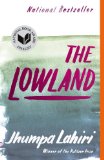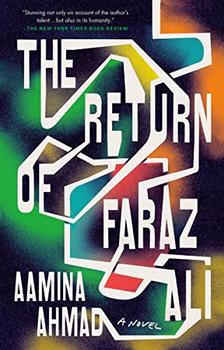Summary | Excerpt | Reading Guide | Reviews | Beyond the book | Read-Alikes | Genres & Themes | Author Bio

Critics' Opinion:
Readers' Opinion:
First Published:
Sep 2013, 352 pages
Paperback:
Jun 2014, 352 pages
 Book Reviewed by:
Book Reviewed by:
Poornima Apte
Buy This Book
A single event can dramatically alter the emotional landscape of the people it affects. The Doppler wave that it creates radiates outward in endless patterns, colliding with new people and circumstances generations down the line, irrevocably shaping them in sometimes minute – but not insignificant – ways. This is the basis for Jhumpa Lahiri's haunting and powerful The Lowland.
Set mostly in Rhode Island and India (specifically in Kolkata), the story revolves around the Mitra brothers, Subhash and Udayan, born fifteen months apart. It is the late '60s, a time of turmoil in their native state of West Bengal. The brothers come of age when the Naxalbari movement serves as a catalyst for the growth of communism in the region (see Beyond the Book). Subhash, the older brother, is reliable, less likely to cause trouble. It is the more daring Udayan who is drawn into the movement with deeply affecting consequences. When an opportunity to pursue graduate studies in the United States presents itself, Subhash decides to leave – eventually doing research in marine science at the University of Rhode Island. Revealing much more wades into dangerous plot spoiler territory. It is sufficient to say that the tableau that unfolds crisscrosses the continents and generations in a beautiful and profoundly moving story.
The Lowland is an improvement on Lahiri's already accomplished novel, The Namesake. Lahiri does not need to resort to clichéd, "tug-at-your-heartstrings" manipulative writing to move her reader to tears (yes, I cried). Through her characters' solitary musings, readers find their own experiences reflected back at them – that alone is enough. Case in point: When Subhash is asked if he feels at home in Rhode Island, Lahiri writes: "He didn't belong, but perhaps it didn't matter. He wanted to tell her that he had been waiting all his life to find Rhode Island. That it was here, in this minute but majestic corner of the world, that he could breathe." This dissection of the ties that bind (to the point that they constrict) is so subtle yet so deeply moving it takes your breath away.
Large and weighty themes – guilt, courage, the consequences of passivity – are ably explored here. The Rhode Island coast serves as a perfect setting for (most of) the story. The solitude the ocean churns up, the driftwood that washes ashore – they are strong metaphors for the novel's "family of solitaries that had collided and dispersed."
If there's one complaint that could be leveled against Lahiri, it is that her work revisits the theme of immigrant displacement over and over again, and sometimes, even in a similar fashion. In The Lowland,
"… Subhash could not fathom the extremes of his life: coming from a city with so little space for humans to inhabit, arriving in a place where there was still so much of it to spare."
This nagging sense of loss, of displacement, reads similar to the one experienced by the main character in the short story, "The Third and Final Continent," from Lahiri's Pulitzer Prize-winning collection, Interpreter of Maladies:
"I know that my achievement is quite ordinary. I am not the only man to seek his fortune far from home, and certainly I am not the first. Still, there are times I am bewildered by each mile I have traveled, each meal I have eaten, each person I have known, each room in which I have slept. As ordinary as it all appears, there are times when it is beyond my imagination."
By this point, Lahiri's writing is mature enough to warrant her taking some chances. It makes you wonder if there's a little of Subhash in her – a person afraid to take risks. Born to immigrant parents, it could, of course, well be that Lahiri finds the subject endlessly fascinating and, really, one can't complain when her work is just so consistently superlative in its spare brilliance. Moreover, to be fair, The Lowland does move beyond the immigrant's narrative even if it is that theme that serves as its essential scaffolding.
At one point, Lahiri writes about a heavy stone on the beach – "too large to unearth, its surface partly visible, but its contours unknown." This single vignette serves as a perfect capture for Lahiri's writing. She knows, like practically no other writer I have read, that our "submerged" inner lives can be rich, expressive – and even violent. Under the most placid surfaces might lie a turbulent mix of feelings just waiting to surface and wash everything in a new light. These impulses brew and bubble and corrode away at her characters' insides and if they eventually find release, shake them to the core. "She'd never felt such violent emotion before…Its destructive current uprooted those things, splintering them and flinging them aside, shearing the leaves from the trees," Lahiri writes of one of the characters.
Readers looking for a plot-driven narrative might not find The Lowland to be their cup of tea. An expert chronicler of the human condition, Lahiri's work has always been deeply introspective, relying less on external "action," relentlessly propelling onward nevertheless. In The Lowland, she again mines the complex emotional landscape of her characters, chiseling away at stone with a fine scalpel. She skillfully illuminates not just the smooth external contours of that rounded beach rock but also the jagged formations that might lie submerged deep below.
![]() This review was originally published in The BookBrowse Review in October 2013, and has been updated for the
June 2014 edition.
Click here to go to this issue.
This review was originally published in The BookBrowse Review in October 2013, and has been updated for the
June 2014 edition.
Click here to go to this issue.

If you liked The Lowland, try these:

by Aamina Ahmad
Published 2023
Sent back to his birthplace - Lahore's notorious red-light district - to hush up the murder of a girl, a man finds himself in an unexpected reckoning with his past.

by Avni Doshi
Published 2022
Shortlisted for the 2020 Booker Prize, a searing literary debut novel set in India about mothers and daughters, obsession and betrayal.





The House on Biscayne Bay
by Chanel Cleeton
As death stalks a gothic mansion in Miami, the lives of two women intertwine as the past and present collide.

The Flower Sisters
by Michelle Collins Anderson
From the new Fannie Flagg of the Ozarks, a richly-woven story of family, forgiveness, and reinvention.

The Funeral Cryer by Wenyan Lu
Debut novelist Wenyan Lu brings us this witty yet profound story about one woman's midlife reawakening in contemporary rural China.
Your guide toexceptional books
BookBrowse seeks out and recommends the best in contemporary fiction and nonfiction—books that not only engage and entertain but also deepen our understanding of ourselves and the world around us.